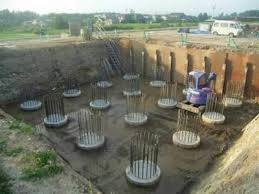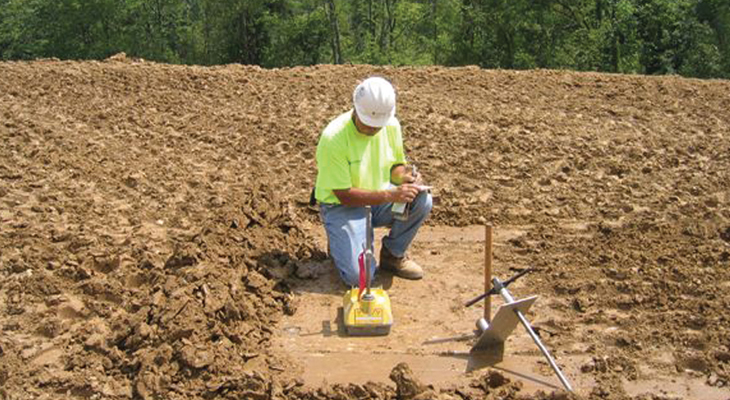Why All About Geotechnical Engineering Matters in Today's Facilities Growth
Why All About Geotechnical Engineering Matters in Today's Facilities Growth
Blog Article
The Importance of Geotechnical Engineering in Dealing With Environmental Challenges and Enhancing Construction Security
Geotechnical engineering offers as a keystone in the crossway of ecological stewardship and building and construction security, supplying essential understandings into the behavior of soil and rock under numerous conditions. By implementing strategic website examinations and customized mitigation steps, geotechnical engineers play an important duty in protecting both human lives and eco-friendly integrity.

Duty of Geotechnical Design
Geotechnical design plays an essential function in the style and building of facilities by dealing with the behavior of dirt and rock products under numerous conditions. This field of design is necessary for comprehending the interaction between frameworks and the ground, which consists of figuring out the load-bearing capacity of soil, analyzing security, and predicting possible negotiation or failure.
Geotechnical designers are in charge of carrying out site investigations, which entail tasting and screening dirt and rock to gather data on their chemical and physical properties. This info is vital for developing foundations, retaining wall surfaces, and various other earth-retaining frameworks that ensure security and durability. Geotechnical design informs the option of suitable building methods and materials, consequently reducing threats linked with soil behavior.
Moreover, the assimilation of geotechnical engineering concepts right into metropolitan preparation and environmental monitoring is crucial for attending to challenges such as ground contamination and groundwater monitoring. By understanding geotechnical aspects, designers can create lasting remedies that enhance the strength of facilities versus all-natural dangers, while also advertising ecological stewardship. Eventually, the function of geotechnical design is vital for attaining secure, durable, and environmentally aware construction methods.
Dirt Erosion Reduction
Dirt erosion poses a substantial threat to both environmental stability and facilities honesty, influencing about 24 billion lots of productive soil lost yearly worldwide. This phenomenon is intensified by aspects such as deforestation, urbanization, and bad agricultural practices. Geotechnical engineering plays a critical role in establishing efficient soil erosion reduction strategies that guard both the atmosphere and building jobs.
One method entails the implementation of erosion control approaches such as plant life growing, which supports soil through origin systems. Furthermore, the building of keeping balconies and walls can effectively reduce surface area overflow and safeguard vulnerable locations from erosion. Proper water drainage style is likewise essential; it minimizes water buildup and guides excess runoff far from crucial structures.
In addition, geotechnical engineers use dirt stabilization strategies, such as the application of geotextiles and naturally degradable mats, to improve soil communication and prevent destruction - geotechnical engineer description. Routine surveillance and evaluation of erosion-prone sites allow timely interventions, making certain long-lasting sustainability. By incorporating these techniques, geotechnical design not only alleviates the impacts of soil disintegration but likewise contributes to the durability of infrastructure against environmental obstacles, ultimately promoting a more secure and a lot more lasting constructed atmosphere
Groundwater Security Approaches
Groundwater works as a vital resource for alcohol consumption water, farming, and industrial processes, making its security essential for environmental sustainability and public wellness. Reliable groundwater protection strategies are critical in reducing contamination dangers and making certain the longevity of this resource.

Routine surveillance of groundwater high quality is also necessary, enabling very early detection of contamination sources and facilitating timely removal efforts. Using sophisticated modern technologies, such as geophysical surveys and remote picking up, aids in determining potential dangers to groundwater reserves.
Moreover, public education and learning and stakeholder engagement are critical, promoting area support for groundwater security campaigns. all about geotechnical engineering. By combining regulative actions, technological developments, and area participation, we can create a thorough structure that safeguards groundwater resources while promoting lasting growth and construction methods
Landslide Danger Monitoring
Landslides position considerable hazards to both human safety and infrastructure, making efficient danger monitoring strategies necessary. Geotechnical design plays an important duty in identifying, evaluating, and mitigating landslide dangers. A detailed understanding of incline security, soil auto mechanics, and hydrology is essential for developing efficient threat administration plans.
The initial step in landslide danger administration includes complete website examinations, which consist of geological mapping and soil testing. These investigations help engineers assess the possibility for landslides by recognizing essential elements such as slope angles, soil composition, and water web content. Making use of innovative innovations such as remote noticing and geophysical surveys can enhance the precision of these assessments.
As soon as threats are identified, ideal reduction steps can be implemented. These may consist of design options such as keeping wall surfaces, water drainage systems, and incline stabilization techniques. In addition, monitoring systems need to be established to spot signs of ground activity and modifications in water levels, permitting for positive treatments.

Enhancing Building And Construction Safety
Construction sites frequently present a myriad of risks that can jeopardize worker safety and security and task honesty. Geotechnical design plays an additional resources important role in improving building safety by providing important insights right into subsurface problems. Via comprehensive dirt and rock evaluation, geotechnical engineers can identify possible dangers, such as soil instability, groundwater issues, and seismic vulnerabilities, which may endanger the safety of construction activities.
Implementing geotechnical options, such as correct foundation design and the usage of retaining structures, minimizes these risks substantially. These solutions not only make certain the stability of the structures being developed yet also produce a more secure working setting for building and construction personnel.
Furthermore, promoting a culture of security with training and adherence to developed safety and security methods better boosts building and recommended you read construction website safety. By incorporating geotechnical proficiency into the preparation and implementation stages, building and construction jobs can accomplish greater security requirements, ultimately shielding employees and making certain effective job completion.
Final Thought
In final thought, geotechnical engineering acts as a crucial discipline in taking on ecological difficulties and promoting construction safety. Via reliable soil erosion reduction, groundwater protection approaches, and landslide threat administration, geotechnical engineers add to the growth of durable infrastructure. The assimilation of these methods fosters a more secure building environment and boosts the sustainability of civil engineering projects. Inevitably, the know-how of geotechnical engineers is indispensable in guarding both natural deposits and human lives against prospective hazards.
Geotechnical design serves as a keystone in the crossway of ecological stewardship and building security, supplying crucial insights right into the behavior of soil and rock under various problems. Geotechnical design educates the selection of suitable building and construction approaches and products, thereby reducing dangers connected with soil behavior.
Geotechnical design official source plays a critical function in establishing reliable dirt disintegration mitigation approaches that safeguard both the environment and construction jobs.
Additionally, geotechnical designers utilize soil stabilization methods, such as the application of geotextiles and biodegradable floor coverings, to enhance soil communication and protect against deterioration. Via thorough soil and rock evaluation, geotechnical engineers can determine possible threats, such as dirt instability, groundwater problems, and seismic susceptabilities, which might compromise the safety of building activities.
Report this page